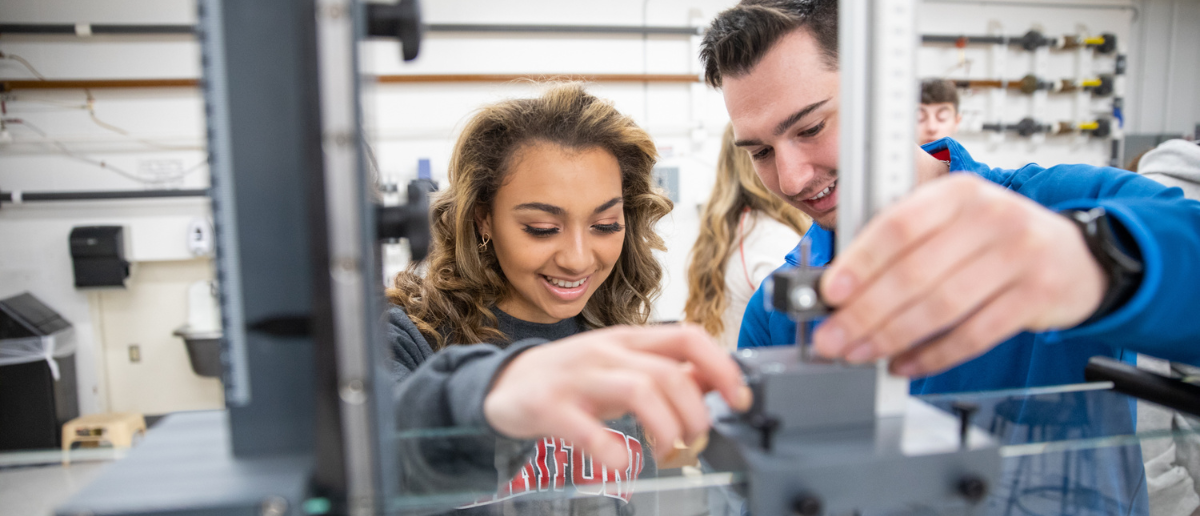
Civil Engineering - BS
The Civil Engineering program will prepare students for careers in various areas, such as a structural engineer, transportation, or environmental engineer.
The Biomedical Engineering program has three options that all have a strong foundation in traditional engineering, with basic engineering courses required prior to biomedical coursework.
Bachelor of Science
127
The biomedical engineering program prepares you to work in today’s healthcare industry and learn how to support professionals, hospitals, and medical offices by creating and maintaining important tools and resources.
Biomedical engineers speak two languages: that of the engineer and that of the health professional. Our curriculum is designed to help students masterfully intertwine the two and yield a successful career in the biomedical engineering industry.
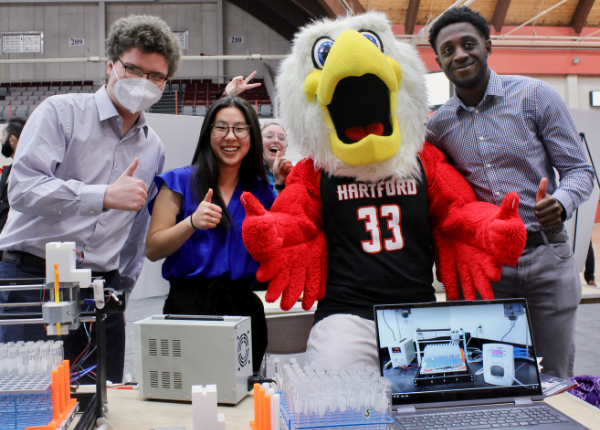
The biomedical engineering minor provides students matriculating into bachelor’s degree programs in other colleges of the University, especially the sciences and the other engineering majors, with an introduction to the discipline of biomedical engineering.
For more information, and to see a complete list of degree requirements, visit the Course Catalog.
The pre-medicine option includes organic chemistry and other courses related to preparing a student for entry into graduate school programs in the health professions. This option also includes the university-wide sequence in pre-health profession seminar courses. Learn more.
The electrical option adds a focus on the electrical engineering principles behind biomedical devices with upper-level electrical engineering courses. This option assists students who wish to work with instrumentation upkeep and design in a hospital or industry setting. Learn more.
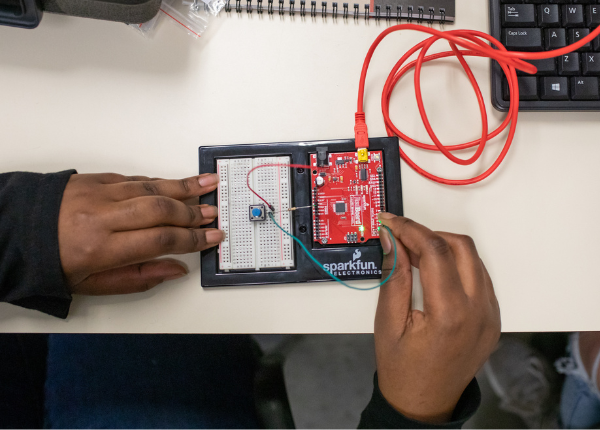
Our biomedical engineering program is designed to prepare you for career success.
Along with rigorous academic training, you will gain hands-on experience throughout your time as a student. You will present your work to your peers and instructors, as well as to the public, and because our faculty work closely with leading health-related institutions and industries, you have opportunities to work on research projects and participate in internships.
Our graduates go on to work at companies like Stryker, Flex, Hartford Healthcare, and Medtronic.
Biomedical Engineering, 2024
Being a part of the Biomedical Engineering Society has allowed me to grow my network with biomedical engineers from inside and outside UHart. I’ve met graduates who have gone directly into the workforce, grad school, med school, or even law school. In addition, networking “mixers” helped heighten my awareness of biomedical engineering uses.
The biomedical engineering program is accredited by the Engineering Accreditation Commission of ABET, https://www.abet.org.
The biomedical engineering program seeks to prepare qualified students for productive, rewarding careers in the engineering profession, either for entry-level practice in biomedical engineering or for entrance into appropriate graduate programs. During their careers, our alumni
The engineering design experience is distributed over the entire engineering curriculum. This experience begins in the first year with engineering and design and continues through and culminates with a Senior Design Capstone experience. The Senior Capstone work ensures that the students have mastered preparatory engineering and engineering science courses.
Basic concepts of physics, chemistry, and mathematics are the foundations on which all engineering education is built. Basic tools of engineering, such as graphic communications, computer usage, mechanics, and thermofluids complete the introductory phase of the program.
All biomedical engineering program graduates are required to complete courses designed to give the students a grounding in anatomy and physiology, biomechanics, biofluids, bioinstrumentation, and the structure of materials used by biomedical engineers. Along with the engineering courses, students are required to obtain a background in solid mechanics and electrical engineering.
Extensive laboratory experience augments the course work. There are required laboratory classes in the sciences, materials, engineering, and natural phenomena. Written communication of laboratory results is required.
Through participation in the University Interdisciplinary Studies and additional elective courses in the humanities and/or social sciences, students are given the opportunity to broaden their perspectives and to take part in the larger learning community of the University. It is imperative that engineers understand and appreciate the special role that technology plays in our society, as well as the interactions among the various components of our society.
The biomedical engineering program has three basic concentrations: the standard, one designed for those students who wish to enter the health professions, and the electrical engineering concentration. Those students who wish to enter health professions are required to take a full year of organic chemistry prior to their senior year. All students who are interested in the health professions are required to join the pre-health professions program. The Pre-Health Profession Advisory Committee has developed a 3 - 1-credit courses for each of the first three undergraduate years to help students prepare for health profession graduate school applications.
The student learning outcomes of the biomedical engineering program leading to BSBE degree are aligned with the student learning outcomes of ABET EAC (1 through 7), and prepare graduates of the program to attain the program educational objectives.
Student outcomes (1) through (7) are articulated as follows:
(1) an ability to identify, formulate, and solve complex engineering problems by applying principles of engineering, science, and mathematics
(2) an ability to apply engineering design to produce solutions that meet specified needs with consideration of public health, safety, and welfare, as well as global, cultural, social, environmental, and economic factors
(3) an ability to communicate effectively with a range of audiences
(4) an ability to recognize ethical and professional responsibilities in engineering situations and make informed judgments, which must consider the impact of engineering solutions in global, economic, environmental, and societal contexts
(5) an ability to function effectively on a team whose members together provide leadership, create a collaborative and inclusive environment, establish goals, plan tasks, and meet objectives
(6) an ability to develop and conduct appropriate experimentation, analyze and interpret data, and use engineering judgment to draw conclusions
(7) an ability to acquire and apply new knowledge as needed, using appropriate learning strategies.
Biomedical Engineering, following the ABET Program Specific Criteria (PSCs), gives our students experience in:
| Academic Year | First-Year | Sophomore | Junior | Senior | Total Graduates |
|---|---|---|---|---|---|
| 20-21 | 15 | 9 | 15 | 15 | 12 |
| 19-20 | 13 | 15 | 13 | 16 | 13 |
| 18-19 | 14 | 18 | 15 | 20 | 23 |
| 17-18 | 16 | 14 | 18 | 21 | 19 |
| 16-17 | 22 | 22 | 18 | 29 | 28 |
The program is designed to allow full-time engineering students to earn their Bachelor of Science (BS) and Master of Engineering (MEng) degrees in five years of study. Two graduate-level courses taken in the undergraduate program may be applied to both undergraduate and graduate degree requirements. Students usually commit to the program at the start of the second semester of their junior year, and juniors who are interested should contact their department chair.
In order to be accepted into the program, students must have a 3.0 cumulative grade point average at the end of the junior year (below 3.0 will be considered on a case-by-case basis).
Contact Laurie Granstrand to learn more.

The Civil Engineering program will prepare students for careers in various areas, such as a structural engineer, transportation, or environmental engineer.
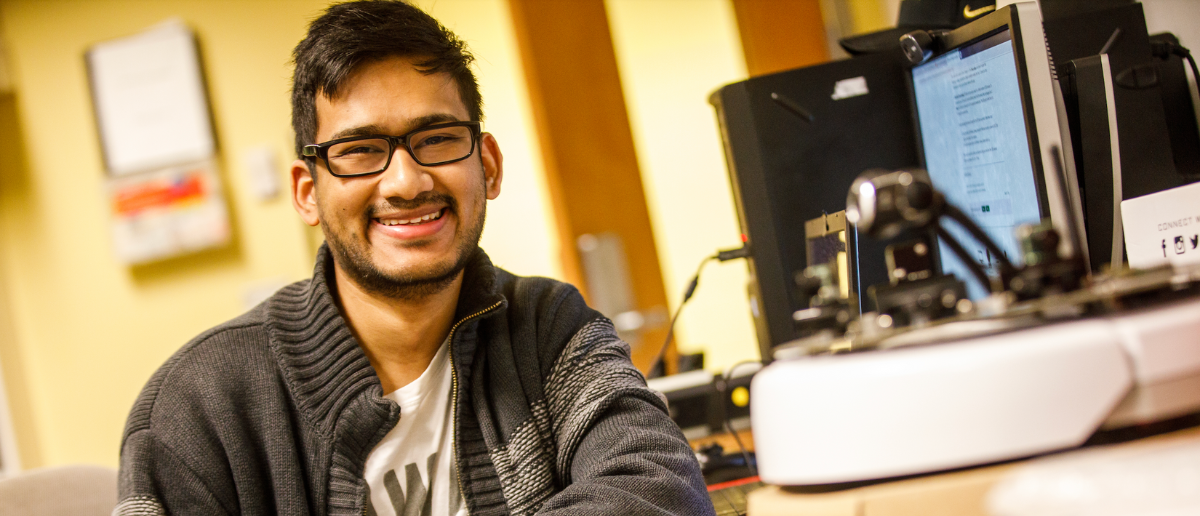
Students with educational and career goals and objectives that cross disciplines may be candidates for an interdisciplinary engineering studies degree with CETA.
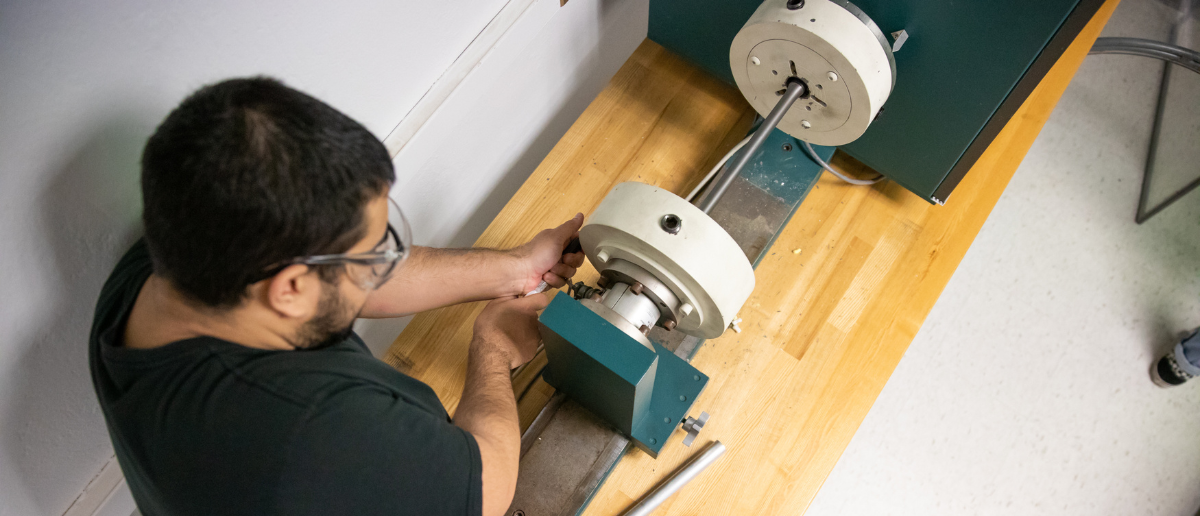
Mechanical Engineering truly embodies the spirit of creativity and innovation as it is one of the broadest areas of study in engineering. This diverse program encompasses key aspects of engineering that deal with the application of mechanics to the design of machines.